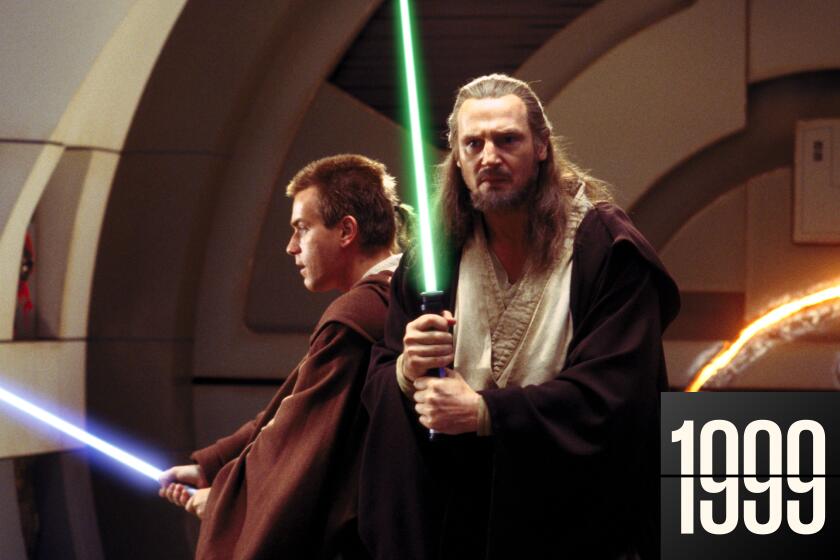Sony to Pay $3.4 Billion for Columbia Pictures : Japanese Firm Willing to Offer High Price to Get Film, TV Software for Video Equipment It Makes
In the largest U.S. acquisition to date by a Japanese firm, Columbia Pictures Entertainment agreed Wednesday to be acquired by Sony Corp. for $3.4 billion in cash.
Sony immediately pledged to put the 65-year-old movie and TV studio in the hands of Sony’s U.S. subsidiary and to “keep it as independent as possible, as a full-fledged member of the U.S. film industry.”
Sony executives said that they were in talks with producers Peter Guber and Jon Peters, co-chief executives of Guber-Peters Entertainment Co., about taking some management role at the company. Industry sources say Sony is considering making Guber Columbia’s chief executive and speculated that Sony might also buy up the small, publicly traded Guber-Peters firm.
Columbia Pictures Entertainment includes the Columbia Pictures and Tri-Star studios, television programming and syndication operations, a huge film and TV library and the 820-screen Loews movie theater chain. The 2,500-employee company has been secretly talking with Sony intermittently for more than a year, and it received a firm buyout proposal last weekend.
Columbia’s board voted on the Sony proposal at a meeting in New York at 8:30 a.m. Wednesday and sat down to sign papers with Sony executives an hour later.
The sale is part of a consolidation that the film industry is undergoing as increasing entertainment viewing worldwide has driven up the studios’ values. Already this year, the Warner Bros. studio has been sold to Time Inc. with its parent, Warner Communications; and MGM/UA Communications has agreed to be sold to Qintex Group of Australia.
The Columbia deal represents the first time that a Japanese concern has purchased a major Hollywood studio.
Sony was willing to pay a lofty $27 a share for a company with meager earnings because of the strategic value of Columbia’s films and TV programs to a concern with a strong hold on emerging TV and audio technologies, analysts said. Columbia’s films will provide the “software” for Sony videocassette recorders, for example, and for the 8-millimeter recorder Sony is trying to popularize.
The purchase of the studio “extends Sony’s long-term strategy of building a total entertainment business around the synergy of audio and video hardware and software,” said Michael P. Schulhof, vice chairman of Sony Corp. of America, in a statement.
Analysts said that the high price offered by Sony makes it unlikely that a competing bid will emerge at the last minute.
Coca-Cola Co., Columbia’s largest shareholder, with a 49% stake, has given Sony an option to purchase those shares, Sony said. Coca-Cola’s management has pledged that it will recommend sale of the shares at a board meeting set for Oct. 2. Allen & Co., the New York investment banking firm that holds a 3% stake in Columbia, has given Sony an option to buy its shares as well.
Columbia’s two top executives, President and chief executive Victor R. Kaufman and chief operating officer Lewis Korman, will leave the company when the sale is completed, Columbia said.
Schulhof said in an interview that he has held “conversations with Peter Guber and Jon Peters, and we’re hopeful some kind of an arrangement can be reached.” He would not elaborate. Trading in Guber-Peters stock was suspended at 9:26 a.m. Wednesday after rumors of the talks were publicized.
Reports of Guber’s possible appointment raised questions in Hollywood about Columbia movie chief Dawn Steel’s future, as well as the future of other senior personnel at Columbia. Some observers wondered if Guber’s connections with Warner Bros. suggested that the new regime might lure talent from that studio.
Schulhof said Columbia is “run by very capable people” and described the studio’s future as “business as usual.” He refused to comment on Steel’s future or on how effective he believes she has been since she began trying to reverse the movie unit’s sagging fortunes last year.
“I know her only by reputation, and obviously the company thinks very highly of her,” said Schulhof, who is also a director of Sony.
A key player in the Sony-Columbia talks has been Walter Yetnikoff, chairman of Sony’s CBS Records unit. Schulhof said Yetnikoff would have a voice in Columbia’s “strategic decisions” but added that Columbia would be “independent” of CBS Records.
Schulhof said major layoffs are “not our style . . . . We’re not a (leveraged buyout) outfit; we didn’t buy the company to carve it up.”
He noted that employment has increased at CBS Records since Sony purchased it from CBS Inc. early last year for $2 billion.
Since it was acquired, CBS Records has again moved into music publishing and has begun manufacturing compact discs for the first time, he said. In all, Sony Corp. of America employs 12,000, operates six major factories and is “very much an American company, run by Americans,” Schulhof said.
He said he did not expect the company’s Japanese ownership to be an obstacle in Hollywood, where personal relationships are so often crucial.
The acquisition will mean that Coca-Cola will end its difficult seven-year adventure in entertainment with an enormous profit. The stock sale will bring about $1.5 billion before taxes, or $1.2 billion after taxes.
The soft drink company scaled back its involvement in 1987, when it combined Columbia, Tri-Star and its other entertainment units into one company and spun off 51% of it to the public.
In Britain on Wednesday, former Columbia Pictures movie chief David Puttnam said he believed that Coca-Cola had been looking to sell its remaining shares even in 1987. “I had no doubt . . . this was going to happen,” said the director, who alienated many of Hollywood’s most powerful figures during his iconoclastic reign.
In a statement, Columbia Chairman Donald R. Keough said Sony was “an ideal buyer . . . . It has all the right characteristics and, very importantly, has the ability to take the company to its next important step.”
Staff writer Kathryn Harris in Los Angeles contributed to this story.
RELATED STORIES: Business, Page 1
More to Read
The biggest entertainment stories
Get our big stories about Hollywood, film, television, music, arts, culture and more right in your inbox as soon as they publish.
You may occasionally receive promotional content from the Los Angeles Times.







